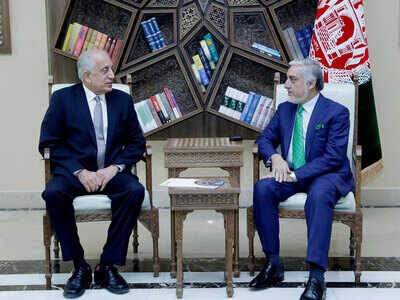
Highlights
WASHINGTON: The Trump administration’s Afghan “peace deal” with Taliban is coming apart even before it has been signed. The United States is preparing to cut and run from Afghanistan amid the sound of bomb blasts and gunfire announcing the victory of extremism over a patchy 18-year American effort to ensure there is never another 9/11.
A bomb blast on Thursday at a Kabul check post that killed a US and a Romanian service member among ten people killed underscored a political explosion in Washington when it emerged that Secretary of State Mike Pompeo has declined to sign an agreement stitched together by Zalmay Khalilzad, President Trump’s special representative for Afghanistan.
Pompeo, a former CIA Director, is apparently paying heed to a legion of former diplomats and officials who are saying the deal amounts to surrendering to Taliban and will eventually enable the return to power of Pakistan-backed forces that hosted the terrorists who carried out the 9/11 attack on America.
According to Time magazine, which first reported on the fissures in the Trump administration, Taliban asked for Pompeo to sign an agreement with the Islamic Emirate of Afghanistan, the official name of the government founded by the Taliban in Afghanistan in 1996, because that would amount to de facto recognition of the Taliban as a legitimate political entity. But he declined to do so, conveying that “when there is an agreement that is approved by all parties, including President Trump, and if the Secretary is the appropriate signatory,” he will sign it.
Pompeo’s bailout enraged Trump’s rightwing supporters, who want the President to keep to his promise to bring US troops back home from Afghanistan before the 2020 election, and who see the Secretary of State’s bailing out as a betrayal, although Trump himself has not commented on it. “Pompeo, who hated President Donald Trump before he wormed his way into the administration, is undermining President Trump’s peace plan in Afghanistan… (he is) apparently willing to abuse his power to obstruct the President’s peace achievement,” the blog Big League Politics wrote.
Trump has tried to walk a vague, if delicate, middle path, making it appear to his supporters as if he is pulling out all US troops while conveying to those who are skeptical of the deal that upwards of 8000 US military personnel will remain in Afghanistan to ensure Taliban sticks to the agreement. Under the sketchy agreement, the US is reportedly committing to pull out some 5400 troops, roughly a third of the present force, within 135 days, without even seeking guarantees for the survival of the incumbent pro-US (and pro-India) Ghani government in Kabul or even an end to the fighting in Afghanistan.
Already, the Taliban is starting to celebrate the US defeat and exit, with two bomb blasts this week even as Khalilzad is canvassing support for his deal in Washington. The developments have left the Ghani government, which has largely been kept out of the loop, in disarray. “No one speaks with certainty. None,” an Afghan official taking part in briefings on the deal with Khalilzad told Time. “It is all based on hope. There is no trust. There is no history of trust. There is no evidence of honesty and sincerity from the Taliban,” and intercepted communications “show that they think they have fooled the US. while the US. believes that should the Taliban cheat, they will pay a hefty price.”
Celebrating the return of Taliban will be Pakistan, which birthed and nurtured these medieval extremists in its madrassas to take over Afghanistan, which it regards as a “strategic depth” against India. Although the Taliban hosted the terrorists who carried out the 9/11 attack, there was a prelude to it that will be of concern to New Delhi. Taliban also welcomed the dogs of war Pakistan used in Jammu and Kashmir, notably Maulana Masood Azhar, Omar Saeed Sheikh, Mushtaq Ahmad Zargar, who India had to free in a hostage exchange after Pakistani terrorists hijacked an Indian Airlines planes from Kathmandu and flew it to Kandahar in 1999. The hijackers and the terrorists remain safe in Pakistan.
Only a few US commentators recall the role Pakistan played in the rise of Taliban and in terrorism across the world. “Khalilzad’s agreement also makes no mention of the Pakistani sanctuaries which the Taliban now enjoy. He engages in a logical flaw, apparently by giving credence to his Taliban interlocutors Afghan nationalism, while simultaneously ignoring that they had collectively spent more time in Pakistan than in Afghanistan. That Pakistan also provided safe haven to Osama Bin Laden as the al Qaeda leader plotted attacks globally appears forgotten by both Khalilzad and those willing to fast track his agreement,'' wrote Michael Rubin, a former Pentagon official and a resident scholar at the American Enterprise Institute.
A bomb blast on Thursday at a Kabul check post that killed a US and a Romanian service member among ten people killed underscored a political explosion in Washington when it emerged that Secretary of State Mike Pompeo has declined to sign an agreement stitched together by Zalmay Khalilzad, President Trump’s special representative for Afghanistan.
Pompeo, a former CIA Director, is apparently paying heed to a legion of former diplomats and officials who are saying the deal amounts to surrendering to Taliban and will eventually enable the return to power of Pakistan-backed forces that hosted the terrorists who carried out the 9/11 attack on America.
According to Time magazine, which first reported on the fissures in the Trump administration, Taliban asked for Pompeo to sign an agreement with the Islamic Emirate of Afghanistan, the official name of the government founded by the Taliban in Afghanistan in 1996, because that would amount to de facto recognition of the Taliban as a legitimate political entity. But he declined to do so, conveying that “when there is an agreement that is approved by all parties, including President Trump, and if the Secretary is the appropriate signatory,” he will sign it.
Pompeo’s bailout enraged Trump’s rightwing supporters, who want the President to keep to his promise to bring US troops back home from Afghanistan before the 2020 election, and who see the Secretary of State’s bailing out as a betrayal, although Trump himself has not commented on it. “Pompeo, who hated President Donald Trump before he wormed his way into the administration, is undermining President Trump’s peace plan in Afghanistan… (he is) apparently willing to abuse his power to obstruct the President’s peace achievement,” the blog Big League Politics wrote.
Trump has tried to walk a vague, if delicate, middle path, making it appear to his supporters as if he is pulling out all US troops while conveying to those who are skeptical of the deal that upwards of 8000 US military personnel will remain in Afghanistan to ensure Taliban sticks to the agreement. Under the sketchy agreement, the US is reportedly committing to pull out some 5400 troops, roughly a third of the present force, within 135 days, without even seeking guarantees for the survival of the incumbent pro-US (and pro-India) Ghani government in Kabul or even an end to the fighting in Afghanistan.
Already, the Taliban is starting to celebrate the US defeat and exit, with two bomb blasts this week even as Khalilzad is canvassing support for his deal in Washington. The developments have left the Ghani government, which has largely been kept out of the loop, in disarray. “No one speaks with certainty. None,” an Afghan official taking part in briefings on the deal with Khalilzad told Time. “It is all based on hope. There is no trust. There is no history of trust. There is no evidence of honesty and sincerity from the Taliban,” and intercepted communications “show that they think they have fooled the US. while the US. believes that should the Taliban cheat, they will pay a hefty price.”
Celebrating the return of Taliban will be Pakistan, which birthed and nurtured these medieval extremists in its madrassas to take over Afghanistan, which it regards as a “strategic depth” against India. Although the Taliban hosted the terrorists who carried out the 9/11 attack, there was a prelude to it that will be of concern to New Delhi. Taliban also welcomed the dogs of war Pakistan used in Jammu and Kashmir, notably Maulana Masood Azhar, Omar Saeed Sheikh, Mushtaq Ahmad Zargar, who India had to free in a hostage exchange after Pakistani terrorists hijacked an Indian Airlines planes from Kathmandu and flew it to Kandahar in 1999. The hijackers and the terrorists remain safe in Pakistan.
Only a few US commentators recall the role Pakistan played in the rise of Taliban and in terrorism across the world. “Khalilzad’s agreement also makes no mention of the Pakistani sanctuaries which the Taliban now enjoy. He engages in a logical flaw, apparently by giving credence to his Taliban interlocutors Afghan nationalism, while simultaneously ignoring that they had collectively spent more time in Pakistan than in Afghanistan. That Pakistan also provided safe haven to Osama Bin Laden as the al Qaeda leader plotted attacks globally appears forgotten by both Khalilzad and those willing to fast track his agreement,'' wrote Michael Rubin, a former Pentagon official and a resident scholar at the American Enterprise Institute.
more from times of india news
Trending Topics
LATEST VIDEOS
Trending Videos
 30-year-old female aid allegedly stripped and beaten by cops in Delhi
30-year-old female aid allegedly stripped and beaten by cops in Delhi  Tiger Shroff's sister Krishna Shroff tagged as 'wifey' in beau Eban Hyams’ Instagram story
Tiger Shroff's sister Krishna Shroff tagged as 'wifey' in beau Eban Hyams’ Instagram story  Bihar: Boarding school caretaker accused of consuming liquor and beating students
Bihar: Boarding school caretaker accused of consuming liquor and beating students  Latest Punjabi Song 'Dhokha' (Motion Poster) Sung By Kumar Nishant
Latest Punjabi Song 'Dhokha' (Motion Poster) Sung By Kumar Nishant
More from TOI
Navbharat Times
Featured Today in Travel
Get the app





